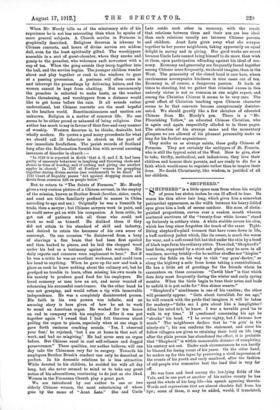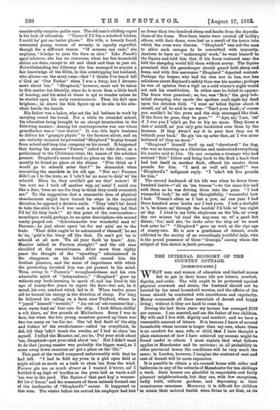" SHUPHERD."
"13 HUPHERD " is a little spare man from whom his weight
of years has stolen inches he can ill afford to lose. He wears his thin silver hair long, which gives him a somewhat patriarchal appearance, as the width between his heavy-lidded eyes gives him a look of serene candour. His nose, of distin- guished proportions, curves over a sunken mouth wherein scattered survivors of the "twenty-four white horses" stand up forlornly in solitary state. A white stubble covers his chin, which has long since forgotten the touch of the razor. Tight- fitting shepherd's-plaid trousers that have come down in life, a buff corduroy jacket which, like its owner, is much the worse for wear, and a soft round felt hat tied under the chin by a band of black tape form his ordinary attire. Thus clad, "Shupherd's " bent form, supported by a stout ash plant, may be seen in all weathers, moving briskly—for he neither shuffles nor "birples" —over the fields on his way to visit " my gran'-darter," or along the highway a mile from home taking a constitutionaL He has a little set of greetings for the friends whom he encounters on these occasions. "Cawld blaw" is that which does duty most frequently during the winter and early spring months. When the birds begin to tune their notes and buds to unfold it is put aside for" Sun shines waarm."
" Shupherd's " nimbleness is one of his vanities ; the other will presently appear. " Gets about torrablish fur me age," he will remark with the pride that imagines it will be taken for modesty—" folks sez I gets about like a lamplighter ! Altus bin usted to't, 'ee knave. I wur a terrable good 'un to walk in my time." If questioned concerning his age he "shucks " his head. "I be ovver eighty, but I dwunno how much." The neighbours declare that he "is goin' in his ninety-six "; his son confirms the statement, and since his fellow villagers are given to retaining their hold on life long after the plain person has abandoned the effort, it is probable that " Shupherd" is within measurable distance of completing his century not out. Under such circumstances he can hardly be blamed for losing count of his years. On the other hand, he makes up for this lapse by preserving a vivid impression of the events of his youth and early manhood, after the fashion of old people who remember best the land that is very far
off.
He was born and bred among the low-lying fields of the Vale, and in one part or another of his native county he has spent the whole of his long life—his speech agreeing thereto. Words and expressions that are almost obsolete fall from his lips ; some of them, it may be added, would, if translated, considerably surprise polite ears. The old man's abiding regret is his lack of education. "'Cause if I'd bin a scholerd lukkee, I could ha' got me better places." His wife, a homely faced, contented young woman of seventy, is equally regretful, though for a different reason. "If arraone can rade," she explains, " it helps to pass the time sa nice." Like Punch's aged labourer, she has no resources, when her few household duties are done, except to sit and think and then to just sit. Notwithstanding her illiteracy she has managed to acquire a fair knowledge of the Bible, in this outstripping her husband, who allows—so the story runs—that "I thinks I've heard tell o' God an' `Our Father' when I wur a bwoy, but I dwunno nowt about 'em." " Shupherd," however, must not be taken in this matter too literally, since he is more than a little hard of hearing, and his mind at times is apt to wander unless he be started upon his early reminiscences. Then his dull eyes brighten ; he draws his thin figure up as he sits in his arm- chair beside the hearth.
His father was a baker, who set the lad betimes to work by carrying round the bread. For a while he attended school, his education being brought to an abrupt termination in the following manner : Among his contemporaries was one whose grandfather was a "cow doctor." It was this boy's business to deliver his " gramp's physic" to the farmers about, and on one unlucky occasion he persuaded " Shupherd " to play truant from school and keep him company on his round. It happened that during his absence "Parson" called to take down, as a preliminary to the Christmas treat, the names of the scholars present. Shupherd's name found no place on the list ; conse- quently be found no place at the dinner. " D'ee think as I would go to schoold arter that ?" he demanded when recounting the anecdote in his old age. " Not me ! Paerson didn't ax I to the trate, so I 'udn't ha' no moor to doin' wi' his schoold. Bless 'ee, they couldn't get me ther' nohow I If 'um sent ma I took off another way, an' seein' I could run like a deer, 'twas no use fur they to think they could overcatch ma." To the suggestion that a reasonable dose of physical chastisement might have turned his steps in the required direction he opposed a derisive smile. " They 'udn't ha' dered to take the stick to I—I wur such a terable strong lad that I'd ha' hit they back !" At this point of the conversation— monologue would, perhaps, be an apter description—his second vanity peeped out. "Schoolmeaster wur wonderful mad wi' Paerson ; he just about upset 'an fur not axin.' me to the
trate. Thee didst ought to be ashummed o' theeself,' he aez to 'un, putt'n the bwoy off like that. Us can't get 'un to schoold at all now. 'Tis all your fault 'ee knaw.' Aye, Maester talked to Paerson straight!" and the old man chuckled at the remembrance. After more than eighty years the thought of the " upsetting " administered to the clergyman on his behalf still caused him the liveliest pleasure, and the sense of importance with which the proceeding invested him was yet present to his mind. Thus, owing to " Parson's " wrongheadedness and his own admirable spirit of " independence," " Shupherd" grew up without any book-learning to speak of, and has lived to the age of ninety-five years to regret the fact—but not, be it noted, his own conduct which led to it. When twelve years old he turned his energy in the direction of sheep. For long he followed his calling on a farm near Twyford, where he "'joyed" himself " terrable." "An out an' out countree that ; nice, warm land an' fust rate fur ship. I took fifteen shillin' a wik there, an' five pounds at Michaelmas. Sorry I was to live, but when the two young measters growed up there war two too many on 'em fur me. One 'ud find fault wi' the ship and t'other wi' the swedeclaners—called 'un everythink, he did, till they 'udn't toneh the swedes, an' I had to clane 'um myself. I telled the Measter, an', sez he, 'Put your stick about
Shupherd—put your stick about 'urn.' But I didn't want to do that [young master was probably the bigger man], so I come away down countree an' got a place on the 'ills."
This part of the world compared unfavourably with that he had left. "I had to fold my yows in a girt open field at night wi'out so much as a bush to shun 'um from the wind. Farmer gin ma as much straew as I wanted h'wever, an' I bnilded it up high wi' hurdles so the yows laid as warm a-sif 'um war in the yard. The Squire o' that part kep' a wunner- ful lot o' foxes," and the massacre of these animals formed one of the landmarks of "Shupherd's" career. It happened on this wise. The winter before his arrival his employer had lost
no fewer than two hundred sheep and lambs from the depreda- tions of the foxes. New-born lambs were carried off bodily; others, with their dams, were lost as a result of the terror into which the ewes were thrown. " Shnpherd" was not the man to allow such ravages to be committed with impunity: Anxious to have no "undercrapin' work," he went himself to the Squire and told him that if his foxes ventured near the fold the sheepdog would kill them without mercy. The Squire promised that his gamekeeper should guard both sheep and foxes, and with this assurance "Shupherd" departed content. Perhaps the keeper, who had his own row to hoe, was less solicitous about Reynard's safety than was his master; perhaps he was of opinion that a vigil on a cold winter's night would not suit his constitution. In either case he failed to appear. The foxes were punctual; so, too, was "Bob," the grey bob- tailed sheepdog, who smote the spoilers until eight lay dead upon the stricken field. "I went an' felled Squire about it meself, an' all he said to me was : "Ten't your fault ; o' coorse you couldn't ha' the yows and the ship stravaged like that. If the foxes be gone, they be gone.' " "'Aye, sir,' I sez, 'an' if I wur you I 'udn't go fur to kip no moor. They dooes a dale o' mastiff, an' you on'y gets backbited over them by the farmers. If they dwun't say it to your face they sez it behindt your back.' He gin 'um up arter that, an' I wur niver bothered wi' they no moor."
"Shupherd" himself bred up and " chewtored " his dog, who was as knowing as a Christian and understood everything his master said to him. On one occasion a stranger who had noticed " Bob " follow and bring back to the flock a lamb that had lost itself in another flock, offered his master three pounds for him. "I med as well sell myself !" was " Shupherd's " indignant reply. "1 'udn't tek five pounds for him."
The second landmark of his life was when he drove three hundred lambs—" all on 'era tweens "—to the same fair and sold them as he was driving them into the pens. "I had wunnerful luck," he will say thoughtfully, "wunnerful luck I had. 'Twasn't often as I lost a yow, an' one year I had three hunderd moor lambs nor I had yows. I tnk a deelight in 't, 'ee knaw, an' through the lambin' I'd bide wi' ura night an' day. I lived in my little shiphouse on the 'ills, an' every day our missus 'ud send the nag-man up wi' a good hot dinner, fur,' said she, he looks arter the ship an' we must look arter he.' " " Shupherd " gave up work at the ripe age of ninety-two. He is now a gentleman of leisure, much addicted to the society of an exceedingly youthful lady, who is the proud possessor of three " Gramps," among whom the subject of this sketch is facile princeps.







































 Previous page
Previous page